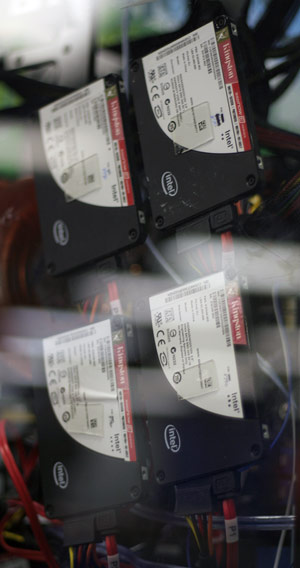Behind the scenes at Kingston Technology
October 21, 2009 | 09:34

Kingston on SSDs
As a natural extension of its Flash business, Kingston has taken to SSDs like a dolphin to water (providing the Earth isn't about to be destroyed by a Vogon constructor fleet). It's naturally close relationship with Intel in its memory compatibility testing meant that it was the first to rebrand the Intel X25-M and X25-E SSDs as its own partnered product in retail.That relationship has been expanded to the latest Intel 34nm SSDs, as well as Toshiba and more recently Samsung too. The Toshiba chipset is a point of pride at Kingston as its engineers "worked and fixed the issues with stuttering" the JMicron 602 chipset underneath originally exhibited.
The firm spent so much time on it because it's incredibly affordable, and Kingston admitted this V-Series is its most popular SSD product by far. Apart from the Intel SSDs, a target of affordability and mass-market friendliness is really the key to Kingston's SSD line-up in the future - we'll see another product in a few weeks. That said, there will also be an undoubtedly expensive 512GB SSD due by the end of the year.
On the subject of support, we probed how Kingston is affected by Intel’s decision not to support the original X25-M with future firmware updates: most notably, the lack of TRIM. We were told it was "still looking at the situation" and committed to saying that "if customers have an issue [Kingston] will exchange it for something else on a case by case basis". We can't fault the company for that, but it seems harsh that Kingston has to pick up Intel's slack.
We probed Kingston again about the enthusiast market but it was made clear that it was not interested in making “overclocked” or niche products in a dozen product lines. It considers SSDs niche and exotic because the large percentage of people in its market research suggests its customers are completely unaware of the benefits, if they even know what an SSD is. Instead it's aiming at a $90 to $110 (£75 to £100) street price for mass market SSD upgrades and bare drives would continue to be offered in addition to separate retail bundles for both desktop and notebooks. Clearly here we want the bare units, which should save us £5 or £10, although the 2.5in to 3.5in adapter kit in the desktop version retail box will undoubtedly be of interest to some.
In one example given, Kingston took its Intel X25-M SSD to an "IT savvy" employee that had a seven minute boot time on his notebook. The SSD reduced that to "just" 90 seconds which is a night and day improvement, but whether the money would be better spent training this guy to use a PC efficiently though... well, we just hope he's not working in your company.
Kingston's SSD product range will be limited to just four or five lines, ranging from value to server: V, V+, M and E. Within the overall product lines there can potentially be several types of products, but Kingston was adamant that they will be clearly differentiated so customers know exactly what they are buying. While made clearly in jest, we cannot reprint the words used against "pot luck" products.
Despite its mass-affordability stance, Kingston would not be drawn to commit about the forecast on when (performance) SSD products will become more affordable, and even went as far as to say that the usual massive yearly increases in capacity and price reduction will entirely level off next year. This, it claims, is directly due to the more cautious investment program discussed above about DRAM products, where capacity and supply is expected not to increase until 2011.
Kingston anticipated that notebooks will be the major recipient of SSDs because of increased demand for portable computing compared to desktops, and that people usually pay more, leaving more room in the budget for one. The now standard 2.5in form factor and the fact it has other power and drop-proof benefits further support this argument. However, Kingston expects different options such as 3.5in and PCI-Express SSDs to also be available in greater variety in the future, but again, would not commit to admitting it will pursue any yet itself.
In addition, despite the rhetorical assertion of value, it also admitted its number one market was corporate and enterprise, where infrastructure was more defined and long term. Performance enhancements from SSDs can make massive power and cost savings, and we think that's where the most money is to be made too.
During the discussion, Kingston dropped an interesting industry titbit: Apple is the one company that drives NAND flash prices up and down. If Apple increases its forecast, prices increase directly, so every other flash product is more expensive. Smartphones also directly affect Flash supply because of micro-SD/SD storage as well, although the major application in the future will be explicit SSD storage for notebooks and desktop PCs that typically use dozens of IC chips each.
One thing we found particularly insightful was that Kingston's thought that SSDs will get closer to the CPU, negating the SATA and southbridge-CPU interconnect as performance increases. We've already seen this idea with the (failed) Intel TurboMemory (Robson) module and in the postponed Braidwood/P57 platform. We asked about Braidwood and were told it was due for launch in October this year, but has now been pushed back indefinitely.

MSI MPG Velox 100R Chassis Review
October 14 2021 | 15:04









Want to comment? Please log in.